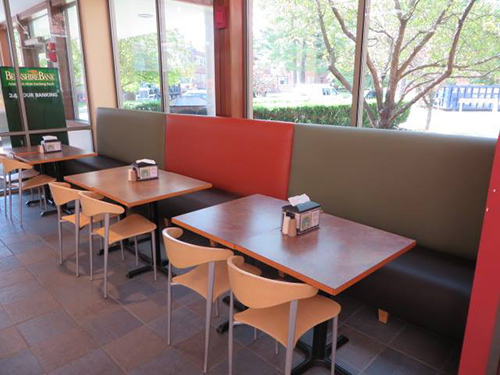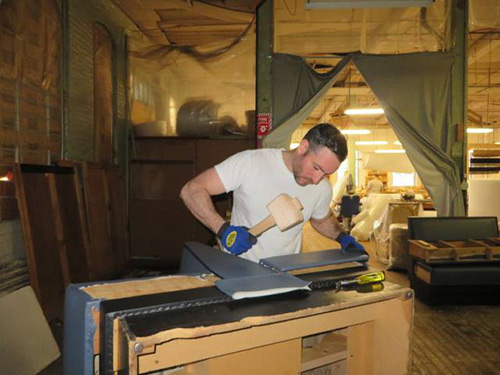IN THIS ISSUE:
Grantee Spotlight: Mercer University Partners to Revitalize Beall’s Hill Neighborhood
University of Massachusetts Creates More than Jobs through the Wellspring Collaborative
Universities Investing in Their Communities: Student- and Administration-Led Approaches
How to Make Place Matter
University of Massachusetts Creates More than Jobs through the Wellspring Collaborative
The Center for Public Policy and Administration (CPPA) at the University of Massachusetts Amherst (UMass Amherst) has undertaken a project to create jobs in Springfield. Although it has high levels of unemployment and empty factories, this Central Massachusetts city is also home to numerous universities, hospitals, and other anchor institutions that spend more than $1.5 billion for goods and services annually. Hoping to capture some of the institutions’ spending to benefit local businesses, CPPA and other area partners established the Wellspring Collaborative in 2013.
Using Cooperatives to Create Community Wealth
As businesses owned by workers who share in the profits and earnings, cooperatives foster community employment and wealth-building through a strategy that has been tested both within and outside the United States. For example, the Mondragon Corporation is a collection of cooperatives based in the Basque region of Spain that was created to address area poverty. Since its founding in 1956, Mondragon has grown to become the biggest business group in the region, with 257 companies employing 74,060 people in facilities located in every inhabited continent. In Cleveland, Ohio, the Evergreen Cooperatives have been providing employment and wealth-building opportunities to the Greater University Circle neighborhoods since 2008. Anchor institutions in the area provide a market for the three cooperatives through their purchasing power, and the for-profit cooperatives hire locally, pay employees a living wage, and allow employees to build equity as part owners.
A Strategy for Springfield
As the former lead community organizer of the Pioneer Valley Project in Springfield, Dr. Fred Rose, a CPPA lecturer and co-director of the Wellspring Collaborative, had become familiar with the issues facing Springfield. The city experienced significant economic decline beginning with the shuttering of several manufacturing and machining companies in the 1960s, and current unemployment, income, and poverty data indicate that the area is still struggling economically.

The Wellspring Upholstery Cooperative secured an upholstery project in Westfield State University’s Pandini dining hall. Credit: Bob Demerjian, Wellspring Collaborative
The UMass President’s Office provided CPPA with a grant in 2010 to explore innovative strategies promoting economic development in Springfield. The grant came at a time when then-Governor Deval Patrick was calling on the University of Massachusetts to contribute to Springfield’s economic development. Rose saw an opportunity to partner with the area’s many anchor institutions to increase the employment and wealth of residents using the cooperative model. UMass Amherst faculty met with Springfield community and economic development groups and gathered information from purchasers at the university to determine appropriate cooperatives for the community.
Similar in structure to the Evergreen Cooperatives, the resulting Wellspring Collaborative is organized under a nonprofit umbrella organization, the Wellspring Cooperative Corporation. The Wellspring Collaborative focuses on creating small start-up businesses that require little up-front capital, so that the cooperatives can hire workers earlier in the development process and allow them to provide input on the businesses they will eventually own. Unlike the Evergreen Cooperatives, however, Wellspring Collaborative’s member cooperatives partner with established local businesses, rather than entrepreneurs.
UMass Amherst faculty sit on the board of the Wellspring Cooperative Corporation, along with employees, unaffiliated individuals, and representatives from partner anchor institutions and community and labor groups. Rose serves as a co-director of the Wellspring Collaborative, and UMass Amherst students have the opportunity to work as research assistants or interns. Although UMass Amherst is a financial sponsor of the Wellspring Collaborative, procurement regulations prohibit the university from making commitments to purchase goods and services from the collaborative; nevertheless, Rose asserts that the cooperatives will be competitive without these commitments because they have been designed to meet institutional needs. Rose also notes that other anchor institutions will have an incentive to contract with these local companies because it is in these institutions’ self-interest to improve their surrounding areas as a means of attracting employees, students, and faculty.
 As of March 2015, one worker has become a part owner in the Wellspring Upholstery cooperative. Credit: Bob Demerjian, Wellspring Collaborative
As of March 2015, one worker has become a part owner in the Wellspring Upholstery cooperative. Credit: Bob Demerjian, Wellspring Collaborative
Wellspring Cooperatives
The first business in the Wellspring Collaborative, the Wellspring Upholstery Cooperative, opened in December 2013. The upholstery co-op is partnered with Alliance Upholstery, a business with more than 40 years of upholstering experience in Springfield. Evan Cohen, Alliance Upholstery’s owner, manages Wellspring Upholstery and trains its new employees. Focusing on large-scale projects for anchor institutions, the cooperative is not in competition with Alliance Upholstery, which generally takes on smaller, upscale upholstery tasks. In fact, the arrangement benefits Cohen, who is training the next generation of upholsterers to continue the trade after he retires. Another beneficiary is the Hampden County Sheriff’s Department, which now has a potential employer for inmates who participate in the department’s upholstery training program.
A greenhouse cooperative is currently under development. A business plan for the greenhouse has already been created, and Wellspring is searching for a site to build a 21,000-square-foot greenhouse. The cooperative plans to partner with an established greenhouse business to provide fresh, local produce for anchor institutions and residents.
A Mutually Beneficial Relationship
Although it is too early to fully measure the impact of the Wellspring Collaborative, the upholstery cooperative has already employed community members, including one worker who has become a part owner, and secured upholstery projects in the Westfield Mayor’s Office, Baystate and Mercy Hospitals, and UMass Amherst’s Berkshire Dining Commons. However, Susan Newton, CPPA associate director for research, Lee Badgett, professor and CPPA director, and Rose emphasize that benefits are accruing to UMass Amherst, as well as to area residents. Newton and Badgett note that “Wellspring has provided an important opportunity for students” through hands-on internships and research opportunities, and some former students have obtained jobs with participating organizations. The Wellspring Collaborative also has the potential to help UMass Amherst meet its goal of acquiring 20 percent of its food from local and sustainable sources by 2020.
As the Wellspring Collaborative grows, so will benefits accrue to the community and its anchor institutions. According to Rose, the Wellspring Collaborative is creating a 5-year plan for business development. The collaborative is considering a food processing cooperative, among other business ideas, to complement its greenhouse.
Source:
University of Massachusetts Amherst. 2015. “UMass Amherst Center for Public Policy and Administration: Projects.” Accessed 4 March 2015; Wellspring Business Cooperative Development. n.d. “About Wellspring.” Accessed 4 March 2015; Lynn Browne, DeAnna Green, with Marques Benton, Prabal Chakrabarti, Yolanda Kodrzycki, Ana Patricia Muñoz, David Plasse, and Richard Walker. 2009. “Towards a More Prosperous Springfield, Massachusetts: Project Introduction and Motivation.” Federal Reserve Bank of Boston Community Affairs Discussion Paper No. 2009-01, 6–12. Accessed 4 March 2015; U.S. Census Bureau. “ACS Demographic and Housing Estimates,” 2011–2013 American Community Survey 3-Year Estimates. Accessed 4 March 2015; University of Massachusetts Amherst. 2014. “Wellspring Collaborative Stitches up Brighter Future for Springfield,” press release, 4 April. Accessed 26 February 2015; Correspondence from Fred Rose, codirector of Wellspring Collaborative, 13 March 2015.
×Source:
Mondragon. n.d. “Mondragon.” Accessed 4 March 2015; Mondragon. n.d. “Presence Worldwide.” Accessed 4 March 2015; Mondragon. 2014. “Mondragon: 1956 – 2014,” 10–11; Mondragon. n.d. “Governance.” Accessed 4 March 2015; Fred Rose. 2014. “Bringing Wealth Creation Closer to Low-Income Communities,” Communities & Banking (Winter), 17–21. Accessed 4 March 2015; Steve Dubb and Ted Howard. 2012. “Leveraging Anchor Institutions for Local Job Creation and Wealth Building.” Big Ideas for Job Creation, 9–12. Accessed 4 March 2015; Evergreen Cooperatives. 2012. “Evergreen Businesses.” Accessed 27 February 2015; Evergreen Cooperatives. 2012. “Structure & Leadership.” Accessed 27 February 2015.
×Source:
Fred Rose. 2014. “Bringing Wealth Creation Closer to Low-Income Communities.” Communities & Banking (Winter), 17–21. Accessed 4 March 2015; Lynn Browne, DeAnna Green, with Marques Benton, Prabal Chakrabarti, Yolanda Kodrzycki, Ana Patricia Muñoz, David Plasse, and Richard Walker. 2009. “Towards a More Prosperous Springfield, Massachusetts: Project Introduction and Motivation.” Accessed 4 March 2015; Federal Reserve Bank of Boston Community Affairs Discussion Paper No. 2009-01, 6–12. Accessed 4 March 2015; U.S. Census Bureau. “ACS Demographic and Housing Estimates,” 2011–2013 American Community Survey 3-Year Estimates. Accessed 4 March 2015.
×Source:
Group interview with Fred Rose; Susan Newton, CPPA associate director for research; and Lee Badgett, professor and CPPA director, 3 March 2015; Documents provided by Fred Rose; Correspondence from Fred Rose, 13 March 2015; Interview with Ethiel Garlington, 18 March 2015.
×Source:
Group interview with Fred Rose; Susan Newton, CPPA associate director for research; and Lee Badgett, professor and CPPA director, 3 March 2015.
×Source:
Group interview with Fred Rose; Susan Newton, CPPA associate director for research; and Lee Badgett, professor and CPPA director, 3 March 2015; Fred Rose. 2014. “Bringing Wealth Creation Closer to Low-Income Communities.” Communities & Banking (Winter), 17–21. Accessed 4 March 2015.
×Source:
Group interview with Fred Rose; Susan Newton, CPPA associate director for research; and Lee Badgett, professor and CPPA director, 3 March 2015; University of Massachusetts Amherst. 2014. “Wellspring Collaborative Stitches up Brighter Future for Springfield.” Accessed 26 February 2015; Correspondence from Fred Rose, 13 March 2015.
×Source:
Group interview with Fred Rose; Susan Newton, CPPA associate director for research; and Lee Badgett, professor and CPPA director, 3 March 2015; University of Massachusetts Amherst. 2014. “New Grants Keep Wellspring Growing,” press release, 9 October. Accessed 26 February 2015.
×Source:
Group interview with Fred Rose, Susan Newton, and Lee Badgett, 3 March 2015; Correspondence with Fred Rose, 13 March 2015.
×

